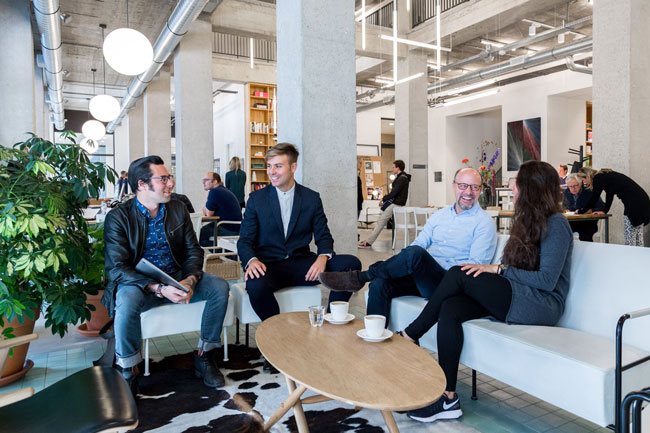Starting up a new business venture is as stressful as it is exciting. Especially in a country where it is estimated that only 37% of Small to Medium Enterprises (SMEs) survive to their fourth year1. In addition to funding, setting up infrastructure and marketing, every new and existing business has a key goal – to attract and retain clients and ensure overhead costs are kept low. However, this is one of the biggest challenges SME’s face and without clients there is no business.
Simply put, SME’s are presented with an age-old and not uniquely South African problem: Where does a fledgling business with limited funding find viable opportunities?
One of the vehicles driving the solution to connecting new businesses with relevant resources, is shared workspace environments. They offer an alternative to the traditional office space set up and is something all start-ups should consider.
The enigmatic and dynamic York Zucchi, co-founder of the SME Movement, member of the Innovation Hub and ex-Goldman Sachs Banker, recently spoke to a group of enthusiastic SMEs and start-ups in one such a shared workspace, on the topic of “Finding clients and growing your business”.
We caught up with him for some advice for start-ups negotiating the South African SME minefield:
Background
Referring to himself as “manufactured in Switzerland, but a child of the world” and having lived in South Africa since 2007, the humble York is perfectly positioned to weigh in on the challenges and solutions facing SMEs here and worldwide.
“My passion for entrepreneurship and the evidence that SMEs are the answer to fixing an economy led me and a few other partners to create what is today one of the world’s most ambitious movements, namely the www.SMEmovement.org – to connect 100 million SMEs to each other. Because SME’s matter dammit!”
The SME Movement is a global campaign to raise the awareness of the importance of SMEs in the economy as well as a drive to connect 100 million SMEs to each other.
“Almost 70% of all jobs in SA and 50% of GDP are attributed to SMEs. The power of SMEs to fix the economy and tackle unemployment is proven. Yet they are under appreciated (just look at the punitive labour legislation and tax treatment of SMEs),” he adds.
Reasons for SME failure
York attributes the reasons for the early failure of SME’s to three factors which all point back to the unique stresses that apply to entrepreneurs and having a long-term view, instead of a ‘get-rich-quick’ approach.
“Being an entrepreneur is quite a juggling act. You are driving a car at 200km/h, while having a conversation with paying passengers, managing staff and fixing the engine and improving the look of the vehicle. Take your eye off the road for 1 second and an obstacle can easily result in a crash. In our research, the 3 most common reasons for failure are:
- Spending too much time looking for funding. Rather look for clients. They are your best service/product feedback mechanism and your best source for funding (it is easier to get finance when you have clients).
- Trying to milk the clients for the maximum amount you can instead of building long term partnerships with your clients (e.g. if you are a website developer, rather charge little but often, than as much as possible but once).
- Using a shotgun approach to find clients and partners instead of targeting exactly who you want to sell to and customising what you sell in terms of the business problems you are trying to solve.”
Finding clients
To find clients, he suggests what seems to be obvious. “In my opinion, the most powerful tool that is available to everyone out there, which is horrendously underutilised, is networking between SMEs.”
“I strongly advocate SMEs talking to other SMEs. You won’t believe how powerful a partnership can become when they collaborate. My advice? Find complementary products/services to bundle and then approach the market together.”
He also recommends that you look carefully at your social media profiles to ensure that they are representing your business in a way that is easy to understand and connect with.
“Imagine you had 4 employees working for you in sales. If after a few months they brought in no leads for your products/services would you still keep them? No? Good. So now look at your social media profiles. They are your free 24/7 employees. Are they setup to generate leads or are you using them to pass time?”
“They should be working for you. Look at what content you share, what your profile description is. Change it to something that makes it easy for people to know what business problem you solve. I realise that no-one enjoys being boxed in, but if people can’t tell what you do, how are you going to generate leads?”
The start-up phase is the time to be boxed in. Let the world know – in plain language – why they should contact you.”
Is co-working and flexible office space a viable solution for start-ups?
“The most important decision you can make as an entrepreneur is to keep your fixed costs as low as possible and start focusing on variable costs. Variable costs rise once demand for products/services is generated.
Flexible work-space allows you to keep a small office for the core of your business and expand when revenue opportunities are created vs. the classical route of trying to figure out demand for the next few years on a fixed office rental contract.
It is the way to go in my view. I just wish there were more co-working spaces for manufacturing and engineering businesses.”
Parting advice
As a last piece of advice, Zucchi stresses the fact that we often over-complicate things to appear bigger or more important than we are.
“Business is really simple. Focus on creating demand for your products/services and then matching that demand.”
He loves it when he hears an entrepreneur complain that they are struggling with too much work but warns there is a flipside. “Creating the company, hiring the people, and investing in long fixed contracts before the demand is created is the surest way to go out of business.”
Amsterdam-born Spaces is one such a co-working space which provides a unique creative environment, with dynamic workspaces that help SME’s think, create and collaborate with other entrepreneurs and like-minded people.
These workspaces are designed in a way that brings people together by offering a range of events for its members and allowing them to network and connect with others to share ideas, business opportunities and learnings.
Exactly the support SMEs in South Africa need.
Source:
1 Figures cited by Minister Lindiwe Zulu when the Department of Small Business Development was created in 2014.
About Spaces
Spaces is a creative work environment with a unique entrepreneurial spirit. Our dynamic workspaces help you think, create and collaborate – while our team makes sure you feel welcome.
We believe work is about people and ideas. Technology has created a modern economy, driven by empowered individuals. This informs the way we develop inspiring workspaces – with a love for design, and where our energetic team takes care of all the details so you can focus on developing your next big idea.
Our culture is built on the energy of our community – interesting people doing exciting things. Say hello to someone new at our events, to help you connect with the buzz around you. It’s all geared toward expanding your networks and connecting you with like-minded members to link up and share ideas.
Whether you’re a small business, entrepreneur or working for a corporation, we provide more than just a place to plug in your laptop. What really makes Spaces unique is the community we’ve worked to cultivate – full of forward thinkers, innovators and game changers who love what they do.
For more information visit: www.spacesworks.com






















































































